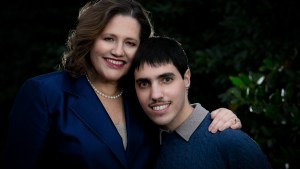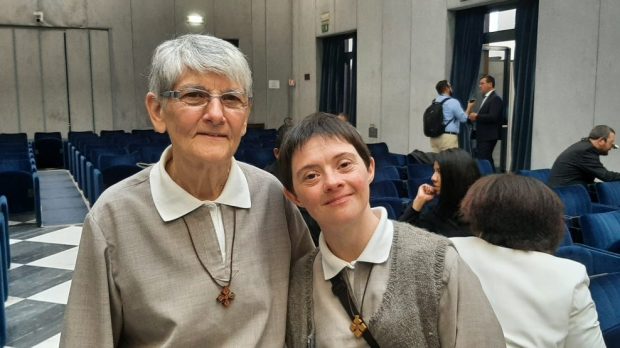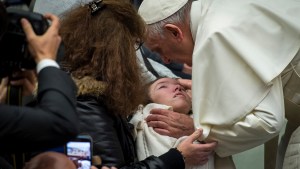With “an extra chromosome,” Claire-Marie wants to orient the Synod towards the love of the little ones,
Five people with disabilities recently presented Pope Francis with the conclusions of a “synodal listening session,” calling on the Church to give them a place in mission and evangelization. Among them was Claire-Marie Rolland, whose Down syndrome has not prevented her from becoming a luminous young consecrated woman.
“I’ve been to Rome five times now,” Claire-Marie recalled enthusiastically a few moments after the Wednesday general audience on September 21. The young woman has already met three popes: John Paul II, on the occasion of her confirmation; Francis, whom she invited to Lourdes; and also Benedict XVI, “a little bear,” she says with disarming tenderness.
This consecrated virgin from the diocese of Bayonne forms a small community of life with Annie Rougier, a former civil servant in the Ministry of the Navy, who is also consecrated under the jurisdiction of the bishop of Bayonne. Having lived in Lourdes for seven years, the two women run the Pôle de Lumière (“Lamppost”) association, dedicated to welcoming families with Down syndrome children.
A spiritual adoption
The synodal process allowed them to share their very atypical life experience, a “story of God,” says Annie, who sees in this accompaniment the fulfillment of a vocation felt in her own childhood. “When I was a little girl in Paris, I was changed by a little girl with Down syndrome (…) who lived next door to us,” explains Annie.
During the summer of 1985, Annie was invited to visit a community that welcomed children abandoned at birth due to disability. A little girl, born on December 8, 1984, and recently welcomed at that home, was the only one not sleeping when she visited the house. Their eyes met. “Something told me that I had to come back to see her … I kind of adopted her,” she recalls.
A long journey would lead to Annie’s consecration in 1993, then to that of Claire-Marie, in 2013. From her childhood, the little girl with Down syndrome showed signs of a desire for God.
“When we went to see her godmother, who was consecrated, she didn’t say hello to anyone but went first to the oratory to kiss Jesus, and only then did she come to greet us. She has had this passion for Jesus since she was a child,” Annie recalls.
The bishop of Bayonne entrusted Claire-Marie with a mission of prayer and evangelization. Disarming in her simplicity, tenderness, and spiritual freedom, the young woman unleashes the gift of tears in many people. While listening by chance to her testimony on Radio-Présence, the person in charge of the pastoral care of the disabled in the diocese of Albi pulled over to the side of the road, crying. His contact with Claire-Marie led to having the young woman speak before 700 pilgrims from his diocese, gathered in Lourdes. “Everyone was touched,” says Annie. She remembers the natural compassion of Claire-Marie, who “went from chair to chair to see the sick.”
Claire-Marie puts her whole life into following Christ, with intensity. “Jesus is very compassionate with young people and children. We must pray for the lonely and the hospitalized. I pray for them at Lourdes,” she says. Her priorities: “Prayer and evangelization. I share this with other people with Down syndrome. And also poverty, because the Church is poor,” she emphasizes.
Young people marked for life by her testimony
Everywhere she goes, Claire-Marie evangelizes — especially in schools. “I’ve known about abortion for a long time, because I was abandoned at birth, and I talk about it a lot to children, to young people, and also to bishops,” she says with confidence.
During a visit to a vocational school, “private but not very Catholic,” Annie remembers, Claire-Marie was invited to speak on disability and difference. Without any hesitation, she changed her angle and spoke on the theme of “overcoming temptation,” in order to warn young people about the risk of abortion.
“You could’ve heard a pin drop,” recalls Annie. “All the young people prayed with her. And when her testimony ended, she recited Pope Leo XIII’s prayer against the devil. I remember very loud music, of unknown origin, which stopped abruptly when Claire-Marie concluded her talk by saying, ‘And you, Lord, be blessed for having created me.’ The young people were in shock. A young girl in tears shared that she too had been abandoned, and Claire-Marie went to console her. All these young people told me that they were marked for life,” recalls Annie. And when the teacher, also in tears, asked her where she found the strength to evangelize without a filter, Claire-Marie answered with humor: “It’s true that it’s more difficult for you, because you’re missing a chromosome!”
With her extra chromosome — considered by a part of public opinion as something shameful to be hidden — Claire-Marie was able to break down barriers. “In fact, I’m not handicapped: I have two arms and two legs, I have everything I need, and I’m very happy like this! I have a lot of joy in me, and it shows!” she says, completely at ease in front of young people who are sometimes reluctant to talk about their faith. “I love the shy ones,” she adds with touching sincerity. In the same way, she awakened the tears of a homeless person near the Vatican by embracing him with these simple words: “I love the poor.”
In the synodal process, Clare-Marie shows the way to a Church in which people with disabilities are not mere recipients of compassionate pastoral care, but full-fledged actors in the mission. People with disabilities “want to be taken seriously and to bring joy to the Christian communities in which they live,” explains Vittorio Scelzo, who is in charge of this theme for the Dicastery for the Laity, Family and Life.
With this in mind, the participants in this synodal listening session asked that at least one person with a disability be designated to participate in the final session of the Synod on Synodality in October 2023 at the Vatican. On that occasion or during a visit to Lourdes, Claire-Marie would like to be able to testify in public, before the pope. “It’s my dearest wish,” she admits, with a confidence in God’s presence that seems to illustrate the words of the Gospel of Matthew: “What you have hidden from the wise and learned, you have revealed to the little ones.”



